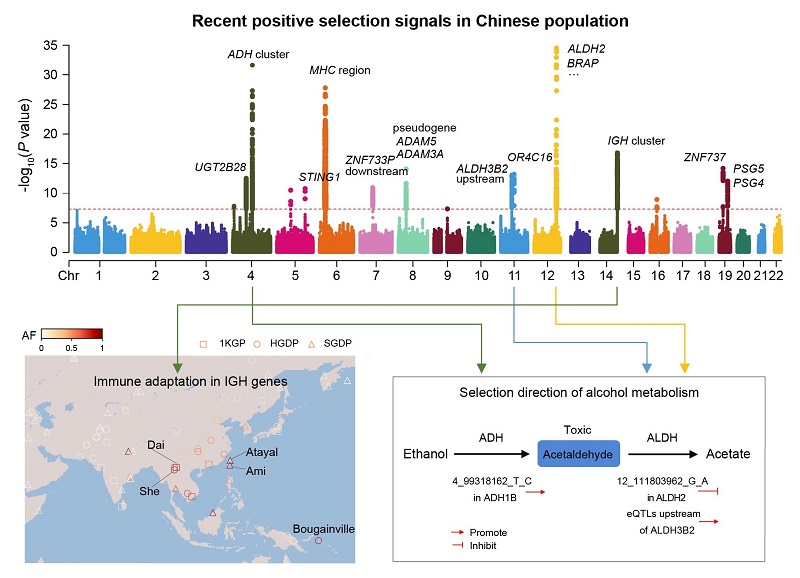Latest findings of recent positive selections in the immunoglobulin heavy chain genes and alcohol metabolism-related genes in the Han Chinese population
Understanding the traits that have undergone positive selection during human evolution can provide insight into the events that have shaped our species, as well as into the diseases that continue to plague us today. As the most populated ethnic group, the Han Chinese have been undergoing genetic selection in their specific historical, geographical and cultural environment.
This study investigated the selection footprints of genomic sequences in Han Chinese, and then attempted to elucidate phenotypic evolution associated with genomic signatures for both monogenic traits and polygenic traits. In total, 24 genetic loci were identified under recent selection by analyzing 3,946 high-depth WGS data.
Among the signals, interestingly and surprisingly, the risk allele (rs117518546-T) of systemic lupus erythematosus (SLE) in the immunoglobulin heavy chain locus was the favored selection allele. The allele frequency of rs117518546-T was almost fixed in southern China and some islands in Oceania, and gradually decreased in northern East Asia with increasing distance from southern China. Though the favored allele increases the risk of autoimmune disease SLE in present day, the enhanced immune response by the allele may improve survival in certain extreme environments in southern China in history, where pathogens such as malaria or lethal viruses were prevalent. The risk of SLE is the side effect of selection for survival, similar to the famous example that the sickle cell mutation in the Hemoglobin-B gene (HBB) was also the target of selection for malaria resistance in Africa.
In addition to well-known ADH1B and ALDH2, this study identified a third novel alcohol metabolism-related gene ALDH3B2 under selection. The selected allele in the ALDH3B2 region had the opposite effect on alcohol metabolism as that in ALDH2. This may be due to the variants and selections occurring at different times in history, which reflected the complexity of evolution. We also identified a novel olfactory perception gene OR4C16 under selection through a stop-gain variant.
Besides monogenic traits, multiple complex traits experienced polygenic adaptation. Particularly, this study indicated that lower blood pressure was favored in natural selection. It was speculated that blood pressure was increased by the environments, lifestyle and dietary habits in the past millennium. At the genetic level, it evolved towards reducing the blood pressure to balance and prevent the blood pressure from rising beyond the body's tolerance.
Finally, a database was built named RePoS (Recent Positive Selection, http://bigdata.ibp.ac.cn/RePoS/) to integrate and display multi-population selection signals.
This study extended the understanding of natural evolution and phenotype adaptation in Han Chinese as well as other populations.

Recent positive selection signals in Han Chinese population
Caption - Positive selection loci across the genome in the Han Chinese population. The adaptive allele (rs117518546-T) in IGH cluster is almost fixed in southern China and some islands in Oceania, and gradually decreased in northern East Asia with increasing distance from southern China. Three alcohol metabolism-related gene loci were identified, including ADH cluster, ALDH2, ALDH3B2.
Article link: https://www.sciencedirect.com/science/article/pii/S2095927323005558
Contact: ZHANG Peng
Institute of Biophysics, Chinese Academy of Sciences
Beijing 100101, China
Email: zhangp@ibp.ac.cn
(Reported by Prof. HE Shunmin's group)

